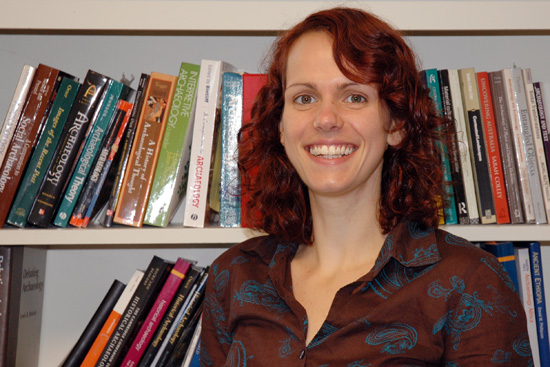Assistant Professor of Anthropology Studies Identity During Colonialism in East Africa
 |
| Sarah Croucher, assistant professor of anthropology, comes to Wesleyan from the University of Manchester in the United Kingdom, where she directed several archeological excavations. |
| Posted 09/19/07 |
| Sarah Croucher has joined the Department of Anthropology as an assistant professor. She is teaching Introduction to Archaeology and Historical Archaeology of the Modern World this fall.
Croucher comes to Wesleyan from the University of Manchester in the United Kingdom, where she was a teaching fellow in the Archeology Department. There, she taught courses which included the theory and philosophy of archaeology and archaeological field practice. Croucher grew up in Kenilworth, Warwickshire. Wesleyan is her first experience teaching within a liberal arts setting. I really love being here at Wesleyan, she says. Liberal arts colleges dont really have a U.K. equivalent, so this is a new and exciting environment for me. During her time at Manchester she participated in, supervised and directed several archeological excavations and fieldwork studies. Her own fieldwork research is currently being pursued through an ongoing investigation of 19th century sites in western Tanzania, where she explores themes of identity in the period of Omani colonialism. Her major research project was survey and excavation work, which was the first to address the archaeology of 19th century clove plantations on Zanzibar, Tanzania. Her interest in these was on the rapid social changes taking place on the East African coast during a period of Omani colonialism. From excavations at a plantation site, she was able to explore the ways in which material culture such as architecture and ceramics were actively engaged in the negotiation of identities for plantation site residents. Recently she has begun a new field project, which investigates caravan routes that ran from the East African coast inland as far as the Congo during the 18th and 19th centuries. These routes were tied to the trading of captive Africans from inland areas to the Indian Ocean coast. She plans to continue this research by excavating sites near the town of Ujiji on the shore of Lake Tanganyika. Croucher has also worked as a supervisor on prehistoric and historic period archaeological projects in Bahrain, Ghana, Scotland and England, as well as multiple projects in Kenya, Tanzania and Uganda. She also worked on excavation and post-excavation analysis stages of the Alderley Sandhills Project, which investigated rural workers cottages inhabited from the 18th to 20th centuries in Cheshire, England. Croucher received her bachelor of arts in 2000, master of arts in 2002 and Ph.D in 2006 in archeology from the University of Manchester. Her Ph.D. thesis was titled Plantations on Zanzibar: An Archeological Approach to Complex Identities, and her masters dissertation was titled The Archaeology of Omani Colonialism on The East African Coast. Topics she studied included the archaeology of ethnicity, religions, gender and sexual politics. Shes the author of Facing Many Ways: Approaches to Archaeological Landscapes of the East African Coast, published in Landscape Archaeology: Global Perspectives by Left Coast Press; Clove Plantations on 19th Century Zanzibar: Possibilities for Gender Archaeology in Africa, published in the Journal of Social Archaeology; and the co-author of People, Not Pots: Locally Produced Ceramics and Identity on the Nineteenth-Century East African Coast, published in the International Journal of African Historical Studies. Croucher also is the co-author of a forthcoming book The Alderley Sandhills Project: The Archaeology of Community Life in Industrial and Post-Industrial England, based on the results from excavations, that will be published by Manchester University Press, in association with English Heritage, in spring 2008. Croucher has received several grants and awards during her time at Manchester. Her fieldwork was supported by grants from the Emslie Horniman Scholarship of the Royal Anthropological Institute, the British Institute in Eastern Africa and the Zochonis Special Enterprise Award from the University of Manchester. Her studies were supported by the Arts and Humanities Research Board, and the William Edwards Educational charity. She has presented more than a dozen papers at international conferences, most recently A neglected aspect? African Diaspora Archaeology in Eastern Africa, for the Society for Historical Archaeology Conference at Colonial Williamsburg, Virginia in January 2007, and Modernity and African Historical Archaeology, at the Theoretical Archeology Group, Exeter, England in December 2006. Next spring, Croucher will co-teach Being and Becoming Human with Daniella Gandolfo, assistant professor of anthropology. The students here are great, and Im finding my teaching very rewarding already, Croucher says, during her third week at Wesleyan. My colleagues are also brilliant, and have made sure that Ive been settling in OK in America. Croucher resides in Middletown and enjoys running and eating cake. |
| By Olivia Drake, The Wesleyan Connection editor |

